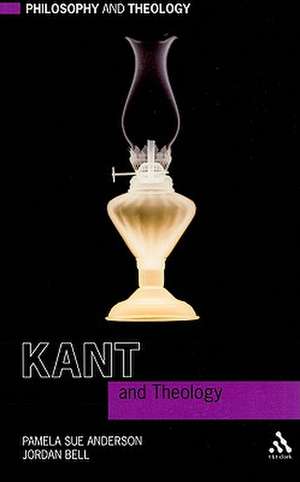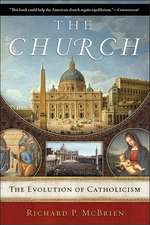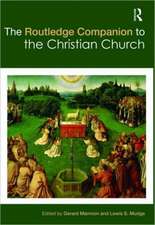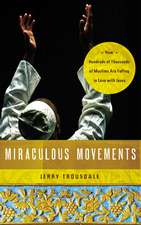Kant and Theology: Philosophy and Theology
Autor Prof Pamela Sue Anderson, Jordan Bellen Limba Engleză Paperback – 26 mai 2010
| Toate formatele și edițiile | Preț | Express |
|---|---|---|
| Paperback (1) | 163.08 lei 3-5 săpt. | |
| Bloomsbury Publishing – 26 mai 2010 | 163.08 lei 3-5 săpt. | |
| Hardback (1) | 565.55 lei 6-8 săpt. | |
| Bloomsbury Publishing – 26 mai 2010 | 565.55 lei 6-8 săpt. |
Din seria Philosophy and Theology
- 14%
 Preț: 178.40 lei
Preț: 178.40 lei - 23%
 Preț: 178.22 lei
Preț: 178.22 lei - 23%
 Preț: 177.77 lei
Preț: 177.77 lei - 11%
 Preț: 217.09 lei
Preț: 217.09 lei - 23%
 Preț: 153.16 lei
Preț: 153.16 lei - 22%
 Preț: 595.90 lei
Preț: 595.90 lei - 8%
 Preț: 158.64 lei
Preț: 158.64 lei - 14%
 Preț: 164.13 lei
Preț: 164.13 lei - 12%
 Preț: 215.69 lei
Preț: 215.69 lei - 12%
 Preț: 214.52 lei
Preț: 214.52 lei - 14%
 Preț: 189.61 lei
Preț: 189.61 lei - 14%
 Preț: 163.78 lei
Preț: 163.78 lei - 14%
 Preț: 165.03 lei
Preț: 165.03 lei - 14%
 Preț: 165.10 lei
Preț: 165.10 lei - 14%
 Preț: 165.03 lei
Preț: 165.03 lei - 22%
 Preț: 594.77 lei
Preț: 594.77 lei - 14%
 Preț: 165.48 lei
Preț: 165.48 lei - 14%
 Preț: 176.44 lei
Preț: 176.44 lei - 14%
 Preț: 175.98 lei
Preț: 175.98 lei - 14%
 Preț: 172.27 lei
Preț: 172.27 lei - 13%
 Preț: 180.61 lei
Preț: 180.61 lei - 11%
 Preț: 177.84 lei
Preț: 177.84 lei - 14%
 Preț: 179.00 lei
Preț: 179.00 lei - 22%
 Preț: 568.40 lei
Preț: 568.40 lei
Preț: 163.08 lei
Preț vechi: 190.70 lei
-14% Nou
Puncte Express: 245
Preț estimativ în valută:
31.21€ • 32.20$ • 26.41£
31.21€ • 32.20$ • 26.41£
Carte disponibilă
Livrare economică 12-26 februarie
Preluare comenzi: 021 569.72.76
Specificații
ISBN-13: 9780567034151
ISBN-10: 0567034151
Pagini: 144
Dimensiuni: 138 x 216 x 11 mm
Greutate: 0.2 kg
Editura: Bloomsbury Publishing
Colecția T&T Clark
Seria Philosophy and Theology
Locul publicării:London, United Kingdom
ISBN-10: 0567034151
Pagini: 144
Dimensiuni: 138 x 216 x 11 mm
Greutate: 0.2 kg
Editura: Bloomsbury Publishing
Colecția T&T Clark
Seria Philosophy and Theology
Locul publicării:London, United Kingdom
Caracteristici
Kant was the most influential of the Enligthenment philosophers
Cuprins
Preface Introduction Kant: His Life and Theology Chapter 1 Themes from Transcendental Idealism Chapter 2 'Moral Religion' for Theologians Chapter 3 Theoretical and Practical Arguments for Theism Chapter 4 Immortality, Corruption/'Radical Evil' and Salvation Conclusion Critical Reception of Kantian Authonomy: Or, A Lesson for Theologians Notes Bibliography Index
Recenzii
'Kant and Theology is written in full awareness of the tendency of many theological readers to dismiss Kant as an especially pernicious advocate of autonomous Enlightenment reason who recognizes no limits to human rationality and volition. They are also aware of the many philosophical readers who simply by-pass Kant's religious concerns or else read them in strongly anti-theological ways. Nevertheless, Kant and Theology presents the case that theology has much to learn from Kant and that there is much in Kant that can helpfully serve contemporary theological reflection, including those tendencies in contemporary theology indicated by such terms as feminism, embodiment, and hermeneutics. It covers basic elements in both the theoretical and the practical writings, and shows how the philosophical concern to understand the nature of knowledge can lead, via metaphysics, to those moral concerns that give religious language its abiding justification. It is clearly written and well-organized and will be of great help to students coming to Kant and to basic issues in the modern philosophy of religion for the first time.' - George Pattison, Lady Margaret Professor of Divinity, University of Oxford, UK.
"Think for yourself" is a message by Kant and is strongly stressed in this most readable, bold and well-written book. The boldness is connected with the authors' ambition to restore Kant's philosophy after the upsurge of feminism and postmodernism, demonstrating its relevance for theology and hermeneutics today. It is indeed an impressive achievement to present Kant in this accessible manner while capturing his intricate thought.' - Catharina Stenqvist, Centre for Theology and Religious Studies, Lund University, Sweden.
Anderson and Bell cover a remarkable amount of material in a commendably clear way. For the most part, Anderson and Bell present Kant in a splendidly accessible way; I would feel comfortable using it in a mid-lever undergraduate course.
'If you are in the market for a fast-moving, one volume introduction to the new Kant, then this is the book for you... Anderson and Bell cover a remarkable amount of material in a commendably clear way.'
Kant and Theology is a welcome addition to the undergraduate classroom, and should not be missed by instructors seeking to help students identify and understand central issues in philosophy and philosophy of religion. It is extremely well-written, clear, concise, and full of helpful examples. Its constructive vision may be warmly or poorly received, but whatever one makes of the books' constructive claims, Kant and Theology is a welcome and badly needed resource for undergraduate classrooms.
"Think for yourself" is a message by Kant and is strongly stressed in this most readable, bold and well-written book. The boldness is connected with the authors' ambition to restore Kant's philosophy after the upsurge of feminism and postmodernism, demonstrating its relevance for theology and hermeneutics today. It is indeed an impressive achievement to present Kant in this accessible manner while capturing his intricate thought.' - Catharina Stenqvist, Centre for Theology and Religious Studies, Lund University, Sweden.
Anderson and Bell cover a remarkable amount of material in a commendably clear way. For the most part, Anderson and Bell present Kant in a splendidly accessible way; I would feel comfortable using it in a mid-lever undergraduate course.
'If you are in the market for a fast-moving, one volume introduction to the new Kant, then this is the book for you... Anderson and Bell cover a remarkable amount of material in a commendably clear way.'
Kant and Theology is a welcome addition to the undergraduate classroom, and should not be missed by instructors seeking to help students identify and understand central issues in philosophy and philosophy of religion. It is extremely well-written, clear, concise, and full of helpful examples. Its constructive vision may be warmly or poorly received, but whatever one makes of the books' constructive claims, Kant and Theology is a welcome and badly needed resource for undergraduate classrooms.










